The NARC scientist said that Pakistan must increase pomegranate production in order to generate significant revenue and improve the economic conditions of the fruit’s growers.

Pakistan PK must introduce modern cultivars, improve market infrastructure, and implement post-harvest handling techniques in order to increase pomegranate production and provide better economic benefits to growers while meeting domestic demands.
Dr Nurullah, a senior scientific officer at the National Agriculture Research Centre, stated this (NARC). He stated that pomegranate production in Pakistan was limited due to a variety of factors, including a lack of suitable planting areas, a lack of farmer awareness, and a slow adoption of new technologies.
“Pomegranate, also known as the “fruit of heaven,” is considered one of the best fruits in the world due to its nutritional value. It is used to treat a variety of diseases because it lowers cholesterol levels in the body and has anti-oxidative properties. It has a two-week shelf life, which prevents early decay and makes it easier for farmers to transport the fruit to market,” he explained.
According to Nurullah, the fruit is native to northern India and Iran, and its main producers include Afghanistan, Iran, Saudi Arabia, India, Palestine, China, some African countries, Italy, and the United States. “Around the world, there are over 760 different varieties of the fruit.”
“It is still grown as a “minor” fruit in Pakistan, according to Fruit and Vegetable Condiments of Pakistan 2018–19. It is grown on only 7,330 hectares and produces only 37,613 tonnes per year. Balochistan is the leading pomegranate producer. In 2018-19, the province produced 27,113 tonnes, while Khyber Pakhtunkhwa produced 2,298 tonnes and Punjab produced 8,202 tonnes in isolated areas on a small scale.”
According to him, Pakistan imported 35,089,960 kilogrammes of pomegranate in 2018–19 but exported only 61,789 kilograms. According to Nurullah, pomegranates thrive in tropical and subtropical climates. “Though it prefers loamy, well-drained soils, it can also thrive in salt-affected soil to a certain extent.”
The NARC scientist said that Pakistan must increase pomegranate production in order to generate significant revenue and improve the economic conditions of the fruit’s growers.
Nurullah maintained that Pakistan, as an agrarian economy, had the best agroecological regions for fruit production. “Our climatic and soil conditions are favourable for producing fruits, particularly pomegranates. However, poor market infrastructure, insufficient post-harvest handling practises, insufficient management, ageing and declining orchards, a lack of coordination between the research and extension sectors, and a lack of farmer awareness are significant barriers to increasing production.”
He advocated for effective measures to increase fruit production, such as the use of modern cultivars on Pakistan’s marginal and fallow lands. “The government should close the gap between farmers and research facilities,” he recommended.